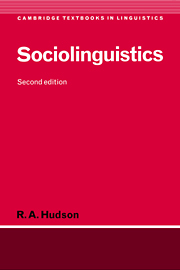3 - Language, culture and thought
Published online by Cambridge University Press: 05 June 2012
Summary
Introduction
Culture
In the last chapter we saw that the phenomenon of language does not have natural divisions between ‘varieties’ of language, which we could call ‘languages’, ‘dialects’ or ‘registers’, though there may be natural internal divisions within it on the basis of ‘levels’ of language, such as vocabulary, syntax, morphology and phonology. We now turn to the external relations of language, to ask whether there are natural boundaries between the phenomena covered by the term ‘language’ and other kinds of phenomena, notably those called ‘culture’ and ‘thought’. Once again we shall arrive at a somewhat complex answer, but it is one which emphasises the similarities between language and other phenomena rather than the differences, and which also stresses the close connections between the phenomena rather than their independence. For instance, I shall argue that many of the properties of language looked at in the last chapter are also properties of culture in general, and that meaning is best studied in relation to culture and thought. To the extent that these conclusions are correct, they present a challenge to the view which has dominated twentieth- century linguistics, that language is both unique and autonomous. The autonomous view of language has recently been challenged strongly from a different direction, by linguists whose main interest is in meaning and who collectively refer to themselves as ‘Cognitive linguists’. Cognitive linguistics now has its own journal with the same name.
- Type
- Chapter
- Information
- Sociolinguistics , pp. 70 - 105Publisher: Cambridge University PressPrint publication year: 1996



